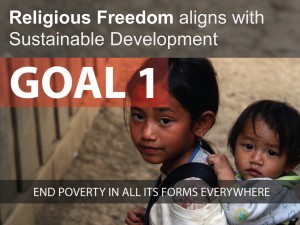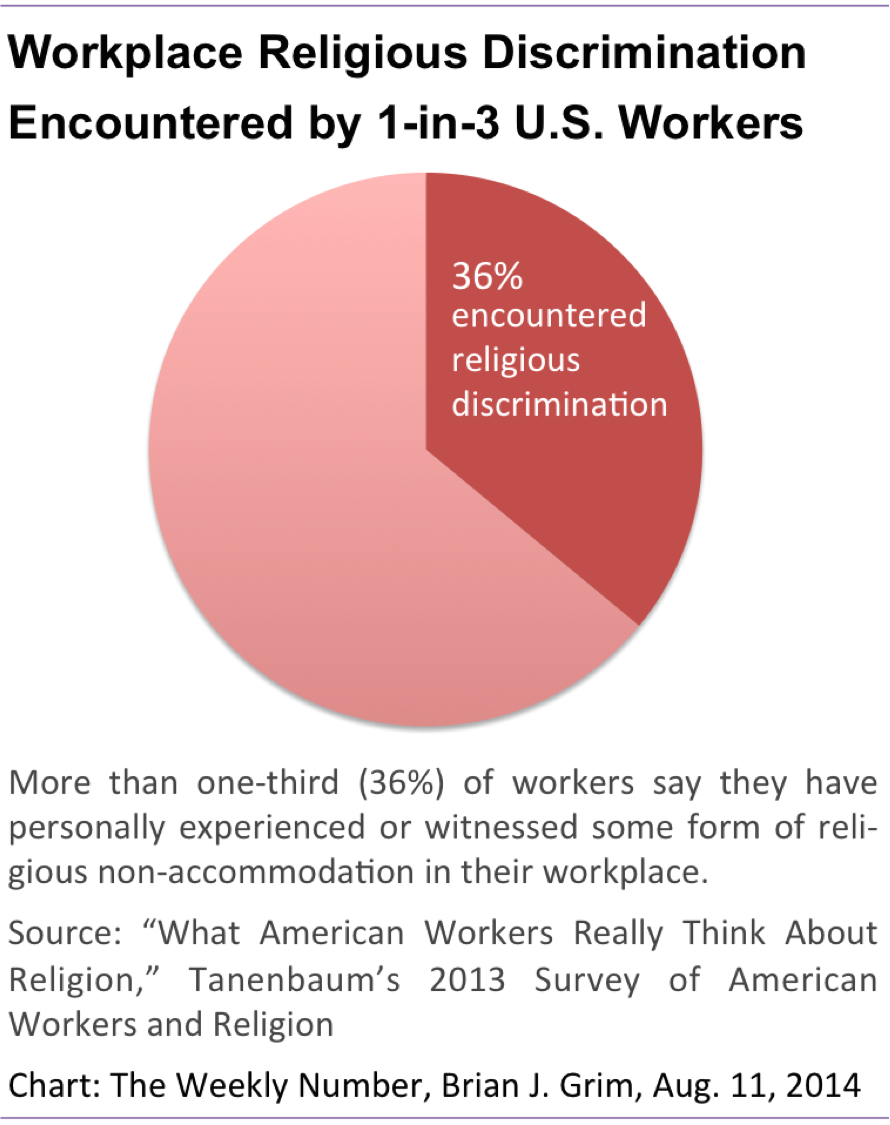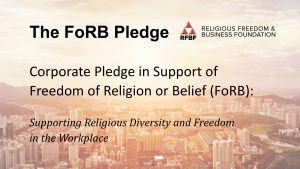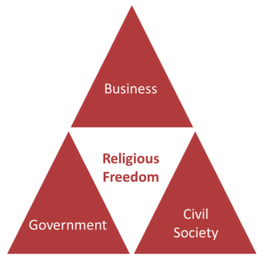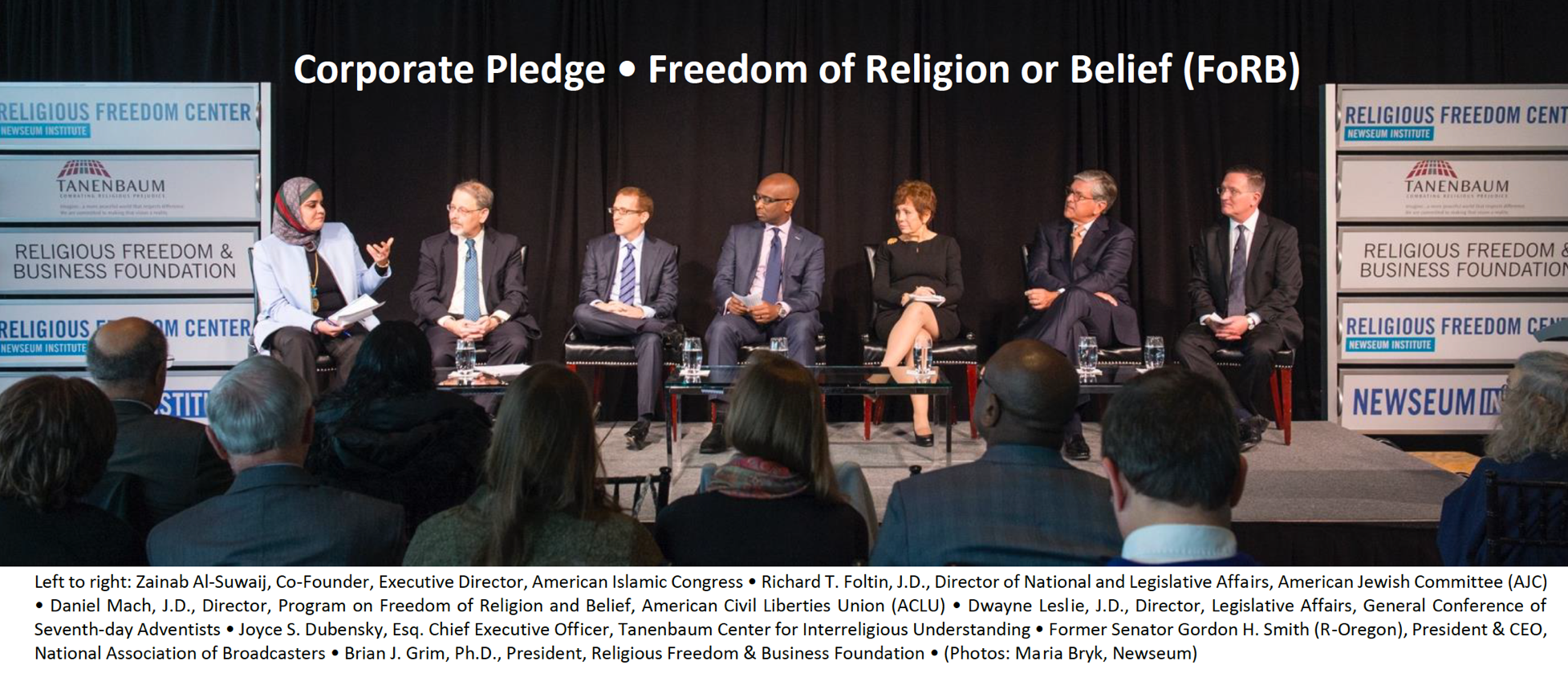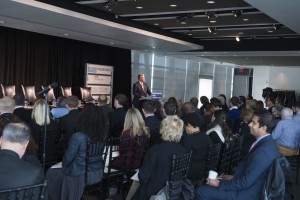With tensions rising due to developments in North Korea’s nuclear missile program, what more strategic place to have the 2018 Global Business & Interfaith Peace Awards than on the Korean peninsula! (See my personal trip report at bottom.)
In my recent trip to South Korea (not North), significant strides were made in logistical preparation for the Global Awards. In my meeting with Mr. Lee Hee-beom (pictured), President of the PyeongChang Organizing Committee for the 2018 Olympic and Paralympic Winter Games, he reaffirmed the recommendation of Christophe De Kepper, Director General of the International Olympic Committee, to hold the awards during the time of the Paralympics. (Mr.De Kepper made that recommendation before the first Global Awards during the 2016 Rio Olympic and Paralympic Summer Games).
The Religious Freedom & Business Foundation, together with the United Nations Global Compact, and the Global Compact Network Korea led by Ambassador Suk-Bum Park (recently the Korean Counsel-General in Houston), we will honor business CEOs who advance religious freedom, interfaith understanding and peace through their companies, advocacy, partnerships and/or philanthropy.
We hold the Awards every two years at each Summer and Winter Paralympics. It is especially appropriate to hold the Awards in the context of the Paralympics given that these Games highlight human triumphs over adversity, including athletes overcoming disabilities stemming from war and conflict.
 The winners will be announced at the Awards based on the assessment of a very distinguished jury of high-level experts.
The winners will be announced at the Awards based on the assessment of a very distinguished jury of high-level experts.
The experts hail from the United Nations (H.E. Nassir Abdulaziz Al-Nasser, UN High Representative for the Alliance of Civilizations); the European Union (H.E. Ján Figeľ, Special Envoy for promotion of freedom of religion or belief outside the EU); the NGO religious freedom community (Dr. Katrina Lantos Swett, President of the Lantos Foundation for Human Rights & Justice, and a former head of the US Commission on International Religious Freedom); the business & peace community (Per L. Saxegaard, Business CEO, and Founder and Executive Chairman of the Business for Peace Foundation, Oslo, Norway); and the religion & peace community (Dr. Sunggon Kim, Honorary President, Asian Conference of Religions for Peace).
Introducing Dr. David Yoo
 Dr. Kyung-Eui (David) Yoo (유경의) is the Religious Freedom & Business Foundation’s representative in Korea, responsible for logistics and programs for the 2018 Global Business & Interfaith Peace Awards to be held March 7-8, 2018, in Seoul and PyeongChang, Korea. The Awards are held biannually in the host country of the Winter and Summer Olympics and Paralympics.
Dr. Kyung-Eui (David) Yoo (유경의) is the Religious Freedom & Business Foundation’s representative in Korea, responsible for logistics and programs for the 2018 Global Business & Interfaith Peace Awards to be held March 7-8, 2018, in Seoul and PyeongChang, Korea. The Awards are held biannually in the host country of the Winter and Summer Olympics and Paralympics.
David is also president of Love in Lights, an international social enterprise devoted to providing villages lacking electricity with the appropriate technology to improve the quality of life of families around the world.
In addition to being RFBF’s coordinator the 2018 Global Business & Interfaith Peace Awards, David Yoo has been engaged in numerous athletic activities with a focus on peace including organizing an international professional football club match and an international football competition for women. He believes sportsmanship is the soil where effective peace initiatives grow. David has worked with the Fédération Internationale de Football Association (FIFA) in 2008 as a member of the Special Project Bureau, FIFA Committee. In 2010, he was Secretary General of the International Peace Sports Federation, and in 2012 he served as President of the International Boxing Federation (IBF) Asia.
In the lead-up to the Global Business & Interfaith Peace Awards, David is serving as Secretary General of the 2017 Appropriate Technology & Humanitarian Aid and Development Global Expo, planned for December 1-3, 2017, in Seoul.
UNESCO
 I was in Seoul to participate in a UNESCO working group to address the rise of nationalism and its impact on peace, cohesion and global citizenship — vital topics given the situation in North Korea today. The group was organized by UNESCO-Headquarters, the Korean National Commission for UNESCO (KNCU) & the Asia-Pacific Centre of Education for International Understanding (APCEIU).
I was in Seoul to participate in a UNESCO working group to address the rise of nationalism and its impact on peace, cohesion and global citizenship — vital topics given the situation in North Korea today. The group was organized by UNESCO-Headquarters, the Korean National Commission for UNESCO (KNCU) & the Asia-Pacific Centre of Education for International Understanding (APCEIU).
There are strong indications that in various regions of the world populist nationalisms and economic protectionism are on the rise. According to recent reports and studies, globalization in trade is in retreat.
Sentiments of support towards nationalist parties and movements (extreme and not so extreme) are being fueled by sharp concerns about unemployment rates and rising income inequalities, as well as negative attitudes towards globalization and immigrants. These political and economic trends seem to be profoundly opposed to what UNESCO’s Global Citizenship Education has been promoting, namely an education that should aim to empower learners to assume active roles to face and resolve global challenges and to become proactive contributors to a more tolerant, inclusive, peaceful and secure world. Paradoxically, in this context, we are witnessing an unprecedented global commitment to quality education and its pivotal role in lifting the disenfranchised out of poverty and accelerating the achievement of peace and sustainable development.
UNESCO is preparing a report on the seminar with recommendations for next steps.
 A highlight of my trip was a visit to the DMZ with David Yoo and another colleague from the U.S., John Dickson. It was a highlight not because of the tragedy of the ongoing division of Korea, but because it took me to the place where my father was stationed as a G.I. during the war.
A highlight of my trip was a visit to the DMZ with David Yoo and another colleague from the U.S., John Dickson. It was a highlight not because of the tragedy of the ongoing division of Korea, but because it took me to the place where my father was stationed as a G.I. during the war.
The drive north east along the DMZ from Seoul is not one my Dad would have done (mostly dirt roads back then), but as I showed him the pictures upon returning, they brought back lots of memories. Aside from modernization, one of the big difference he saw in the pictures between then and now is the abundance of trees and greenery today. During the fighting, everything was stripped bare for fuel or shelter.
Having grown up with him telling stories from those days made the trip especially meaningful. Also, the picture at the bottom is from the months before the Armistice was signed. My Dad was on the G.I. baseball (really softball) teams that competed with other G.I. teams, esp. after the Armistice. He wouldn’t have known it then, but he helped bring to Korea what is now its favorite pastime – baseball (according to the Korean Times).
There is hope in South Korea that the upcoming Olympics will be an opportunity to make peace with the North. So, in a small way, through the Global Business & Interfaith Peace Awards I’m hoping to carry on my father’s legacy of sports and peace.




